A writing quirk is a bad writing habit that sneaks into your manuscript - and threatens to derail it. In this video, author Jenna Moreci explains 10 writing quirks you should avoid to make your manuscript shine.
Find out how ProWritingAid can help you avoid the some of these writing quirks below. And, sign up today for a free trial so you can see for yourself how ProWritingAid can improve your writing.
- 1. Adding Unnecessary Filter Words
- 2. Relying on Crutch Words
- 3. Overusing Adverbs
- 4. Shifting Tenses Unintentionally
- 5. Jumping Between Perspectives
- 6. Using Distracting Dialogue Tags
- 7. Writing Essay Paragraphs, Not Fiction Paragraphs
- 8. Repeating Words in Close Proximity
- 9. Using Inappropriate Jargon
- 10. Mixing Up Your Homophones
- Final Thoughts
- Start editing like a pro with your free ProWritingAid account
- Try ProWritingAid
1. Adding Unnecessary Filter Words
Reading is all about being immersed in a new world. You want to take your reader out of their own experience and drop them into your character's.
Words like "see", "feel", "think", "realize", and "hear" filter your readers' connection with your story's world through your protagonist.
Your character's unique perspective will shape your narrative voice—that's completely fine. But when you use these filter words, you draw attention to the mechanics of that perspective rather than the effect it has on what the character sees.
As you edit, remove unnecessary filter words to help your reader get closer to the action.
So, instead of:
"He saw the woman leave the coffee shop."
Just say:
"The woman left the coffee shop."
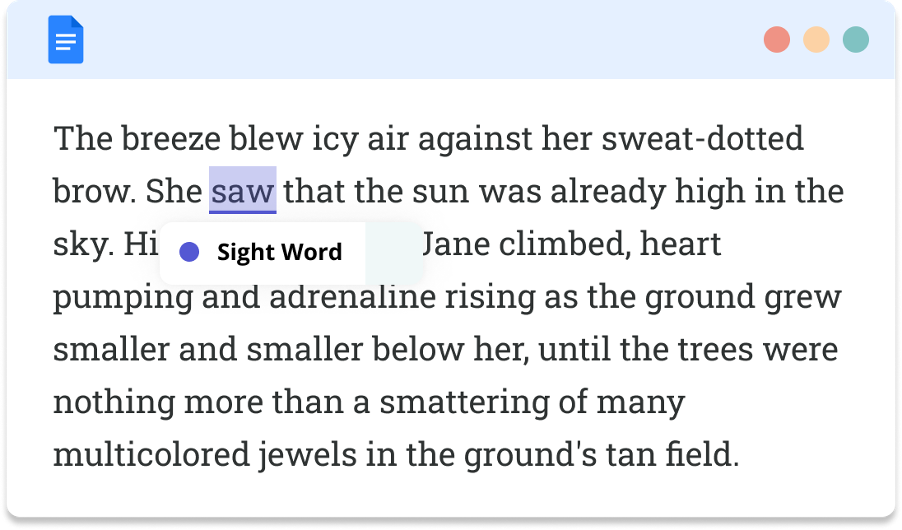
ProWritingAid's Sensory Report highlights sensory filter words so you can make sure they are necessary and rethink them if they're not.
2. Relying on Crutch Words
Crutch words are words you use over and over again. At ProWritingAid, we call them Overused Words.
These are the words you subconsciously rely on while you're writing your manuscript. Jenna's crutch word is 'scuttled', but yours might be an intensifier like 'very', or tentative language like 'just' or 'maybe'. You can use ProWritingAid's Overused Words report to see which words you use the most. Then, you can start replacing them with synonyms.
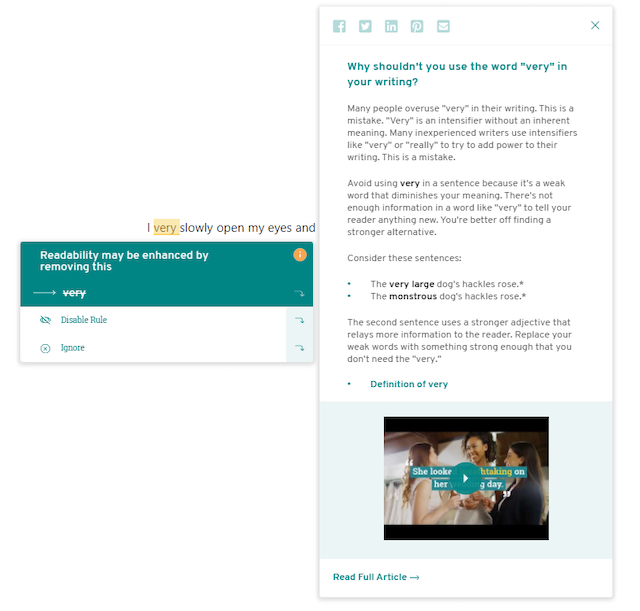
Pro-tip: Stuck for synonyms? ProWritingAid's Word Explorer can help you find the synonym that works best for your writing.
3. Overusing Adverbs
As Jenna says, adverbs are not inherently evil - until they're overused. Actions tend to describe themselves; you don't need to say that your character 'smiles happily' or 'runs quickly'. If you're using an adverb to intensify a verb, it's worth checking if you could be using a stronger verb in the first place. Check out these examples:
ProWritingAid's Writing Style Report will highlight your adverbs for you to help you root out those weak verbs.
4. Shifting Tenses Unintentionally
His legs feel like lead as he ran forward.
Huh? That doesn't quite make sense. Our runner has one leg in the present, and one in the past. Let's fix it:
His legs felt like lead as he ran forward.
Or:
His legs feel like lead as he runs forward.
Check your writing for tense jumps like this to avoid confusing your readers. These shifts are easy to miss, but the clue is in the verbs. In the first example, one verb is in the present (feel) and one is in the past (ran).
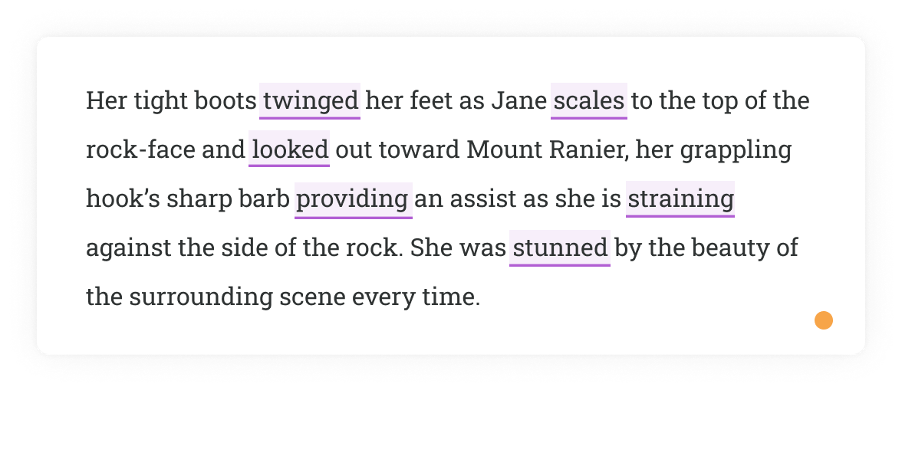
To help make tense inconsistencies easier to spot, run ProWritingAid's Thesaurus Report. You can use the filters to show all of the verbs in your writing as a reminder to check them while you're proofreading.
5. Jumping Between Perspectives
Just like tense, your perspective should stay consistent. You can your change point of view (POV) character, but this should be in a new chapter to make the change clear.
There are two levels to writing consistent perspective. As Jenna mentions in her video, one of these is making sure your character doesn't use information that they aren't supposed to know yet.
The other is ensuring you stick to the first, second or third person point of view once you start writing in it. You cannot write:
I jumped from the edge, her legs flailing as she fell.
Here, we've mixed the first and third person, and as a result our sentence makes no sense. Instead, it should read my legs flailing as I fell.
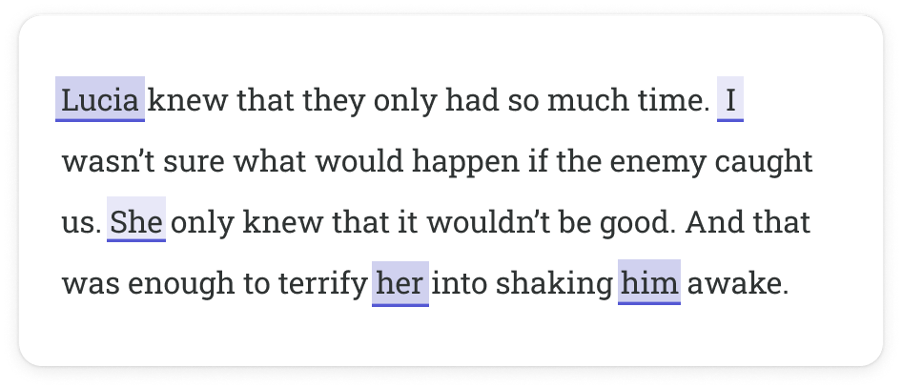
ProWritingAid's Pronoun Report picks out all the pronouns in your writing so you can make sure you're staying consistent.
6. Using Distracting Dialogue Tags
A dialogue tag is a verb that refers a piece of dialogue to a specific speaker or character. The most common dialogue tags are said and asked.
In fact, using other dialogue tags like shouted or squealed will brand you as a novice. And it’s worse if you add an adverb. Only use them to let the reader know who is speaking when necessary. For a more sophisticated piece of writing, use action to show who is speaking instead.
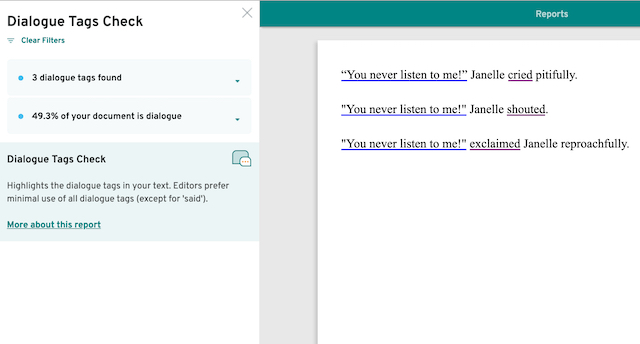
If you're working on a long project, ProWritingAid's Dialogue check will help you scan your document for dialogue tags so you can see where you need to change them, saving time spent trawling through your manuscript yourself.
Pro-tip: The Dialogue check also calculates the percentage of your document that contains dialogue and compares it to published works. Novels rarely contain under 10% or over 80%. Somewhere in the middle is enough to move your readers along without boring them with too much narrative or inane chatter.
7. Writing Essay Paragraphs, Not Fiction Paragraphs
In fiction, your paragraph should change when the subject you're writing about changes, and when a new character starts speaking. If you don't split your paragraphs at these key points, things will get confusing fast.
Use ProWritingAid's Sentence Length report to check for any overly long sentences. These are where you're most likely to have started mixing subjects.
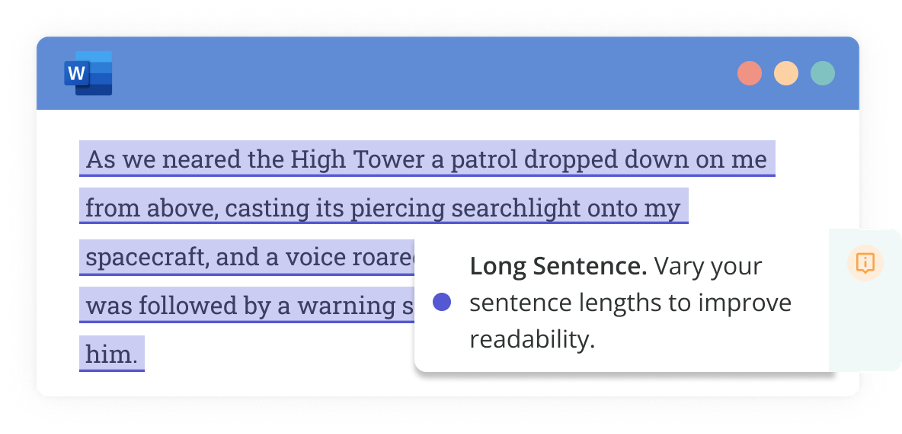
8. Repeating Words in Close Proximity
Using the same word multiple times in proximity will throw your reader off. This is a writing mistake that you might not catch yourself making. But, as Jenna says, when your editor reads your manuscript, repeated words and phrases will be obvious to them right away.
Or will they?
Using ProWritingAid helps you catch the mistakes that copyeditors would spend time fixing in your manuscript before you even send it to them. The Repeats and Echoes reports highlight words and phrases that you've repeated throughout your document, as well as close repeats within single paragraphs.
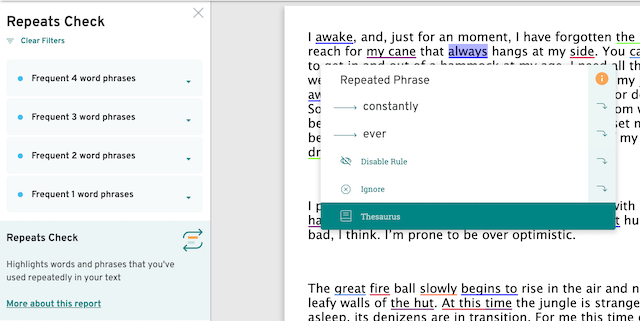
You can use these reports to find (and cut down on using) your crutch word. This is just one of the ways that ProWritingAid can help you learn more about your own writing.
9. Using Inappropriate Jargon
Many of us spend most of our days on the internet, so it makes sense that internet slang, jargon, and even punctuation will slip into our writing offline, too.
But in most cases, the way we write online isn't appropriate for fiction writing. For example, while you might capitalize a word to emphasize it online, in fiction you should use italics instead.
ProWritingAid's Consistency Report shows you where you've used inconsistent punctuation, capitalization, acronyms, and more so you can find those areas where your internet persona has crept into your offline writing.
10. Mixing Up Your Homophones
Homophones and homonyms can catch out even the most experienced writers. When you're writing in a rush, or trying to get your ideas down on the page before they disappear forever, it's easy to use 'its' instead of 'it's'.
ProWritingAid's Homonyms check will highlight all of the homonyms in your writing so that you can check you're using the right word every time.
Final Thoughts
Now you know about these writing quirks you can start finding and fixing them in your own writing. Don't forget to grab your ProWritingAid discount on by watching Jenna's video!
Start editing like a pro with your free ProWritingAid account
When a reader sees a grammar error, they start to lose faith in the writer who made it.
ProWritingAid is one of the best grammar checkers out there - but it's far more than that! The Editing Tool also looks at elements of structure and style that have an impact on how strong and readable your writing is.
More, it helps you learn as you edit, making you a better writer every time you use the program.

